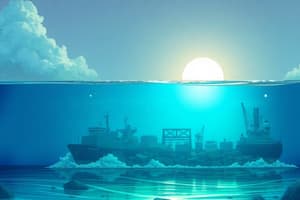Podcast
Questions and Answers
What does MARPOL stand for?
What does MARPOL stand for?
Marine Pollution
In what year was MARPOL originally adopted?
In what year was MARPOL originally adopted?
1973
When did MARPOL come into force?
When did MARPOL come into force?
October 2, 1983
Which of the following is not an annex of MARPOL?
Which of the following is not an annex of MARPOL?
Which annex focuses on the prevention of air pollution from ships?
Which annex focuses on the prevention of air pollution from ships?
What is the focus of Annex IV?
What is the focus of Annex IV?
MARPOL was modified by a protocol in 1980.
MARPOL was modified by a protocol in 1980.
What are the penalties for non-compliance with MARPOL regulations?
What are the penalties for non-compliance with MARPOL regulations?
Which annex includes regulations on the discharge of garbage?
Which annex includes regulations on the discharge of garbage?
What is a major challenge for MARPOL’s implementation in developing countries?
What is a major challenge for MARPOL’s implementation in developing countries?
MARPOL 73/78 is only concerned with oil pollution.
MARPOL 73/78 is only concerned with oil pollution.
Flashcards
What is MARPOL 73/78?
What is MARPOL 73/78?
An international treaty aimed at preventing pollution from ships by establishing regulations for various pollution sources.
What is the original MARPOL Convention?
What is the original MARPOL Convention?
The main body of the MARPOL treaty, adopted in 1973, which outlines general principles and goals for preventing marine pollution from ships.
What is the MARPOL Protocol?
What is the MARPOL Protocol?
An amendment to the MARPOL Convention, adopted in 1978, introducing stricter regulations and adding new annexes to address specific pollution types.
What does Annex I of MARPOL 73/78 cover?
What does Annex I of MARPOL 73/78 cover?
Signup and view all the flashcards
What does Annex II of MARPOL 73/78 cover?
What does Annex II of MARPOL 73/78 cover?
Signup and view all the flashcards
What does Annex III of MARPOL 73/78 cover?
What does Annex III of MARPOL 73/78 cover?
Signup and view all the flashcards
What does Annex IV of MARPOL 73/78 cover?
What does Annex IV of MARPOL 73/78 cover?
Signup and view all the flashcards
What does Annex V of MARPOL 73/78 cover?
What does Annex V of MARPOL 73/78 cover?
Signup and view all the flashcards
What does Annex VI of MARPOL 73/78 cover?
What does Annex VI of MARPOL 73/78 cover?
Signup and view all the flashcards
What are Flag State Responsibilities in MARPOL?
What are Flag State Responsibilities in MARPOL?
Signup and view all the flashcards
What is Port State Control in MARPOL?
What is Port State Control in MARPOL?
Signup and view all the flashcards
Study Notes
What is MARPOL 73/78?
- International Convention for the Prevention of Pollution from Ships, adopted in 1973 and modified by the 1978 Protocol
- Aims to prevent marine pollution from ships
Historical Background
- Originally adopted in 1973
- Protocol added in 1978 following several shipping incidents
- Came into force on October 2, 1983
- Represents global effort to protect marine environment by minimizing ship pollution
Structure of MARPOL 73/78
- Annex I: Prevention of Pollution by Oil
- Annex II: Control of Pollution by Noxious Liquid Substances in Bulk
- Annex III: Prevention of Pollution by Harmful Substances Carried by Sea in Packaged Form
- Annex IV: Prevention of Pollution by Sewage from Ships
- Annex V: Prevention of Pollution by Garbage from Ships
- Annex VI: Prevention of Air Pollution from Ships (added in 1997)
Annex I - Oil Pollution
- Focuses on preventing oil pollution from ship operations and accidents
- Key provisions include:
- Requirements for oil discharge monitoring equipment
- Oil Record Book and Oil Pollution Prevention Certificate
- Special Areas with stricter discharge standards
Annex II - Noxious Liquid Substances
- Focuses on controlling pollution from chemicals carried in bulk
- Key provisions include:
- Categorization of substances based on hazard levels
- Requirements for cargo handling, tank washing, and discharge procedures
- Pollution Prevention Certificate for chemical tankers
Annex III - Harmful Substances in Packaged Form
- Focuses on preventing pollution from harmful substances carried in packaged form
- Key provisions include:
- Proper labeling, documentation, and stowage requirements
- Safety measures for handling and transportation
Annex IV - Sewage Pollution
- Focuses on preventing pollution by sewage from ships
- Key provisions include:
- Regulations on sewage discharge
- Requirement for sewage treatment plants or holding tanks
- Sewage Pollution Prevention Certificate
Annex V - Garbage Pollution
- Focuses on preventing pollution by garbage from ships
- Key provisions include:
- Comprehensive rules on garbage management
- Prohibition of plastic discharge into the sea
- Garbage Record Book and Management Plan requirements
Annex VI - Air Pollution
- Focuses on preventing air pollution from ships
- Key provisions include:
- Limits on sulfur oxide (SOx) and nitrogen oxide (NOx) emissions
- Regulation of ozone-depleting substances
- Emission Control Areas (ECAs) with stricter emission limits
Implementation and Compliance
- Flag State Responsibilities: Ensuring compliance with MARPOL provisions on ships registered under their flag
- Port State Control: Inspections and enforcement of MARPOL regulations in ports
- Penalties: Consequences for non-compliance, including fines and detention
Amendments and Updates
- Continuous evolution with regular amendments to address emerging environmental concerns
- Recent updates include new regulations and stricter emission controls, such as the 2020 sulfur cap
Global Impact
- Environmental Benefits: Significant reduction in marine pollution since implementation
- Challenges:
- Enforcement and compliance in developing countries
- Addressing illegal discharges and pollution
Conclusion
- MARPOL 73/78 is essential international treaty to prevent pollution from ships
- Comprehensive annexes address various pollution types to protect marine environment
- Ongoing commitment and enforcement are essential for achieving MARPOL's goals and a cleaner maritime environment
Studying That Suits You
Use AI to generate personalized quizzes and flashcards to suit your learning preferences.




